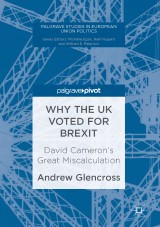Details

Why the UK Voted for Brexit
David Cameron's Great MiscalculationPalgrave Studies in European Union Politics
|
64,19 € |
|
| Verlag: | Palgrave Pivot |
| Format: | |
| Veröffentl.: | 26.10.2016 |
| ISBN/EAN: | 9781137590015 |
| Sprache: | englisch |
Dieses eBook enthält ein Wasserzeichen.
Beschreibungen
<p>This book studies the unprecedented decision of 23 June 2016, which saw the UK electorate vote to leave the EU, turning David Cameron’s referendum gamble into a great miscalculation. It analyzes the renegotiation that preceded the vote, before examining the campaign itself so as to understand why the government’s strategy for winning foundered. It then evaluates the implications that this decision has for the country’s international relations as well as for its domestic politics. The author’s final reflections are on the political philosophy of Brexit, which is founded on a critique of representative democracy. Yet the use of direct democracy to trigger EU withdrawal leaves the supposedly sovereign British people at an impasse. For it is up to the people’s representatives to negotiate the terms of Brexit. By engaging with a highly charged political debate in an accessible and non-partisan manner this book will appeal to a broad readership of academics, policy-makers, journalists, and interested citizens.</p>
<p>Chapter 1 Introduction: The Great Miscalculation.- Chapter 2 The Forty-Year “Neverendum” on the UK’s Relationship with Europe.- Chapter 3 Renegotiating Terms of EU Membership Prior to the referendum.- Chapter 4 The EU Referendum Campaign.- Chapter 5 The Unfinished Business of Brexit.- Chapter 6 Rousseau’s Revenge: The Political Philosophy of Brexit.- References.- Index.</p>
<p><b>Andrew Glencross </b>is Senior Lecturer in the Department of Politics and International Relations, Aston University, UK. He has published widely on the politics of European integration in journals such as <i>Journal of Common Market Studies</i>, <i>International Affairs</i>,<i> Political Studies</i>, and <i>The Political Quarterly</i>. He is a Senior Fellow of the Foreign Policy Research Institute, Philadelphia.</p>
<p>This book studies the unprecedented decision of 23 June 2016, which saw the UK electorate vote to leave the EU, turning David Cameron’s referendum gamble into a great miscalculation. It analyzes the renegotiation that preceded the vote, before examining the campaign itself so as to understand why the government’s strategy for winning foundered. It then evaluates the implications that this decision has for the country’s international relations as well as for its domestic politics. The author’s final reflections are on the political philosophy of Brexit, which is founded on a critique of representative democracy. Yet the use of direct democracy to trigger EU withdrawal leaves the supposedly sovereign British people at an impasse. For it is up to the people’s representatives to negotiate the terms of Brexit. By engaging with a highly charged political debate in an accessible and non-partisan manner this book will appeal to a broad readership of academics, policy-makers, journ</p>alists, and interested citizens.<p></p><p><b>Andrew Glencross </b>is Senior Lecturer in the Department of Politics and International Relations, Aston University, UK. He has published widely on the politics of European integration in journals such as <i>Journal of Common Market Studies</i>, <i>International Affairs</i>,<i> Political Studies</i>, and <i>The Political Quarterly</i>. He is a Senior Fellow of the Foreign Policy Research Institute, Philadelphia.<br/></p>
<p>Provides one of the first studies into the causes and effects of the dramatic result of the referendum on Britain's membership of the EU</p><p>Traces the history of Euroscepticism in Britain before analysing the 2016 referendum campaign on both sides</p><p>Uses the Brexit result to develop discussions concerning sovereignity and direct democracy in Britain</p>
<p>“A brilliant treatment of the Brexit drama and its implications, which manages both to be concise and to provide many illuminating details of the historical and political context.” (Ronald J. Granieri, Foreign Policy Research Institute, USA)</p>

















